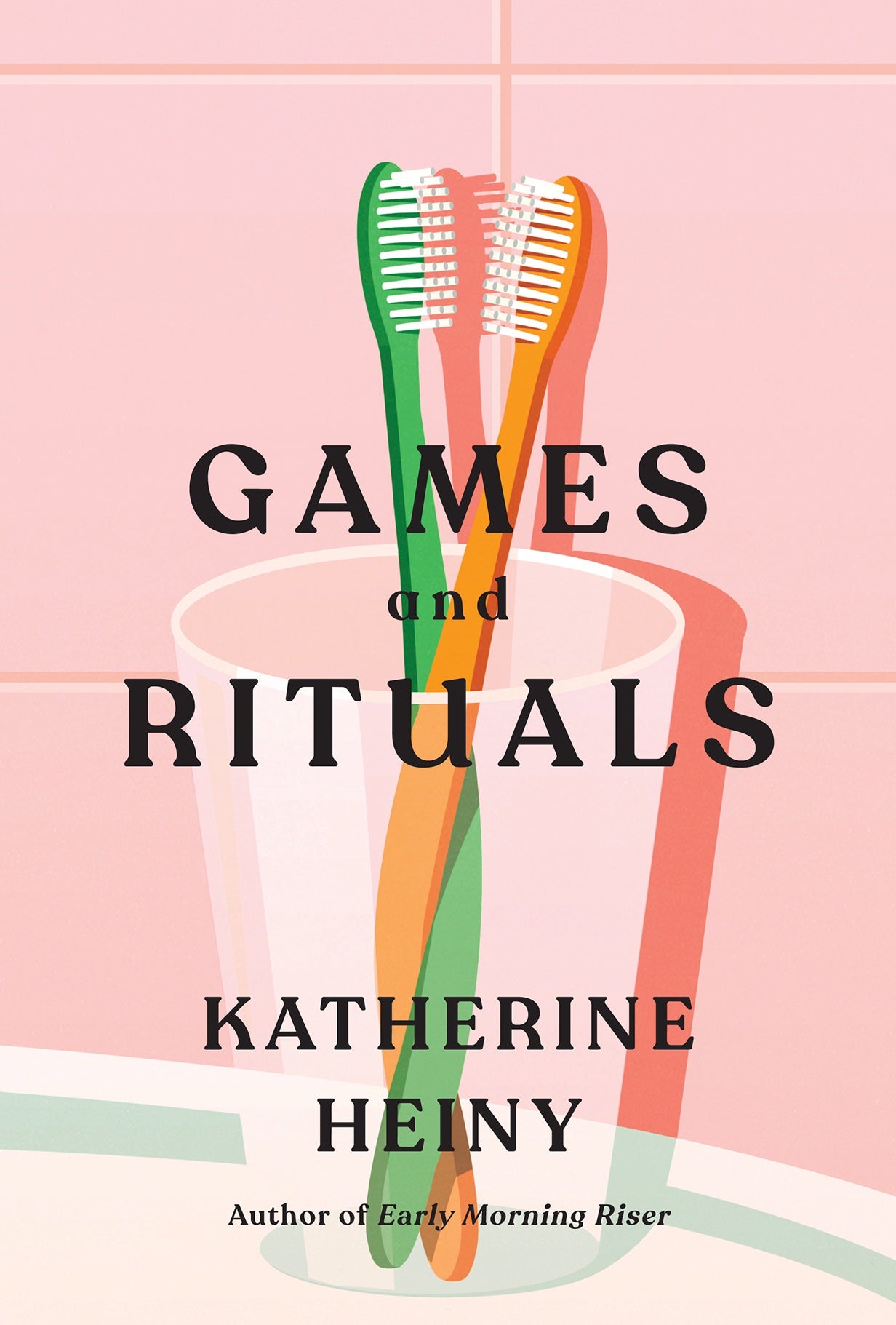Katherine Heiny: ‘Sometimes people say really eccentric things and it makes me really happy’
The ‘Standard Deviation’ author’s eye for human foibles remains unparalleled in her second short story collection, ‘Games and Rituals’. She tells Jessie Thompson about the eccentric incidents that inspire her writing


Anyway, I was gonna tell you, just because it’s a fun story...” It turns out Katherine Heiny doesn’t only write short stories; she speaks in them. Conversation with the Standard Deviation author is peppered with vignettes, delivered in neat packages with droll punchlines. She’s explaining how for her, the germ of an idea usually begins with something from her own life. Take “Damascus”, from her glorious new collection Games and Rituals, in which a mother believes her son is high on life – before realising, actually, he’s probably just high.
“When I was in high school, I would go out drinking at parties, and I would come home and stand at the foot of my parents’ bed – they’d be, like, in bed reading – and just basically do stand-up for 20 minutes. And my parents never thought this was anything other than, like... spontaneous socialisation,” she says incredulously. Then, one day, her son came home from working at the supermarket, looking really happy. “I thought, ‘He loves his job! He’s high on life!’ And then I was like, ‘I can’t believe I just thought that’.”
Heiny is Zooming from her office in Bethesda, Maryland. Behind her is a bookshelf full of copies of her own work, placed there when her family moved home. “Now I feel like I’m really egotistical,” she says jokingly, before swivelling her camera around to show me her old backdrop: a poster of Daryl from The Walking Dead, given to her by her sons. (Watching the show was “our family thing we did together, and I was always like, ‘Nothing bad can ever happen to Daryl, I couldn’t take it’.”) She’s wry and talkative, her face framed by a strawberry blonde bob; in the background, sunlight streams through the windows, her three dogs occasionally barking from another room.
Back when Heiny’s first short story collection – Single, Carefree, Mellow – was published in 2015, it won her comparisons with Nora Ephron, John Cheever, Woody Allen and Lorrie Moore; it also made her the kind of writer who has devout readers. From 2017’s Standard Deviation, a novel about a married couple with a special needs child, to 2021’s Early Morning Riser, a small-town love story, her buoyantly written, sharp witted and charmingly peopled books are the kind you repeatedly re-read or give to your friends.
Games and Rituals, full of relatably weird characters discovering their self-deceptions, proves her to be the most pleasurable architect of the short story form writing today. Many of them are based on nuggets from her life: “561” on her time working as a Samaritan, or “Bridesmaid, Revisited” on that time she wore a bridesmaids dress to work (“a shiny lavender Laura Ashley with puffed sleeves and a full skirt in case you want to picture it for full effect”, she tells me). Others come from passing thoughts she had, or things she overheard, which became mysteries she wanted to solve. “Sky Bar” was inspired by a man she saw drinking at an airport bar, despite the fact he wasn’t getting a flight. “Chicken-Flavoured and Lemon-Scented” came from her realisation that someone – possibly a woman – once gave Ted Bundy a driving test.
Surprisingly, some of the stories in Heiny’s new collection end on a note of melancholy, changing gear to something sadder. She began writing two of the stories in 2020, and in November of that year, her father died. “When I finished those stories, the older characters die – which is not something that I had planned. I think writers write to make sense of the world, it’s how they process the world. So real life tends to get in because you’re trying to figure it out.”
The throughline in Heiny’s work is relationships – often illicit ones. (Heiny herself is happily married with two children.) The moment when two people meet doesn’t interest her, “so I tend to write about middles and ends. A lot of the stories in this collection, it’s people whose relationship is over, but some sort of power dynamic remains.” Most electric is her ability to throw together people who would hate to be in the same room – a husband, his ex-wife and the woman he left her for, for example. Is she fascinated by awkward social situations? “Oh, totally. Totally,” she says, deadly serious, her eyes widening beneath her black-rimmed glasses.
Her radar for people’s eccentricities is exquisite (like the roommate who walks around with a Bluetooth earpiece on all day until 5pm). “A lot of the people that, as a teenager or young person, I just thought were quirky, were actually very unusual and eccentric. And so it’s hard not to play that part up.” Case in point: she recently went to see her GP about the migraines she experiences, and he began to quiz her about the route she drives to see her neurologist. “I’m sure I had some weird smile on my face the whole time,” she tells me, “because I was like, that is such a male thing to be like, ‘Do you take the beltway when you drive there?’”

Moments like these bring her profound joy. “Sometimes people say really, really eccentric things. And it does make me really happy.” She can immediately call to mind countless further anecdotes, committed to memory for her own personal amusement. Like the man on a plane who told her that the leg holes on his underpants were too tight. “I was just like, is this the best thing that’s ever gonna happen to me? Is my whole life gonna be down from here?” Or another man, on another plane, who asked her to climb over him. “I thought he had limited mobility. So I did. And then he got up! Basically, I was tricked into giving this man a lapdance!” Such incidents are usually followed by her immediately texting a friend or family member to share the details. “When really funny things like that happen, even if I’m not writing about them, it’s very inspiring. It’s like, ‘Wow, something else made me laugh, now I can write something funny’.”
Heiny’s writing career got off to an auspicious start: in 1992, when she was just 25, her short story “How to Give the Wrong Impression” was published in The New Yorker. “It was the best thing that ever happened to me, and it opened doors,” she says. But after that, she spent a long time in the wilderness, cranking out Young Adult novels under a pseudonym (which she’ll never reveal), before stopping writing entirely while she brought up her sons. Although she loved being a mother of young children, she was “really unhappy” not writing. “Every time we’d watch a show or a movie that had a writer in it, I’d be like, ‘Oh, that’s not me anymore’,” she says, sadly. Even watching Breaking Bad, when Gale’s crazy lab note journals are discovered, made her depressed. “I remember watching that and being like, ‘Oh, even the nerdy chemist is a more productive writer than I am!’” Now that her sons are teenagers, she’s happy that she “can write about so much more – they widen your life and your experience by millions of whatevers. But I felt that I needed to be writing too. And I got a lot happier when I started writing in addition to everything else.”
In a quirky Heiny-esque detail, her British husband Ian McCredie is an ex-spy. After they first married, she spent some time in London where, at the age of 29, she read two of the books that influenced her the most: High Fidelity and Bridget Jones’s Diary. “I was like, I love this place. This is the greatest place on Earth!” They showed her that “books can be funny, but they can also teach you things”.
Humour matters to her because, she claims: “I’m really insecure. I don’t believe that anybody’s going to keep reading if it’s not funny.” But her writing can also be emotionally devastating. In 2021, she wrote a shattering essay about her first post-lockdown visits to see her mother, who was in a care home with advanced dementia and later passed away. “I felt much better about my mom after writing that. It did clarify a lot of feelings, and helped me figure it out,” she says. “If I hadn’t written it as a piece then I’m sure I would have emailed it to my best friend or cousin or something, saying, ‘This is what happened’.”
As it turned out, people emailed her. She estimates that, in a single weekend, she received 300 emails about the piece. Heiny writes back to all her readers. Some thank her for Standard Deviation’s perceptive portrayal of a child with special needs, while a woman who read Early Morning Riser, at the age of 72, told her: “I’ve always loved my life, but your book made me realise that I had a life that anyone would be proud to have.”
So Heiny doesn’t just speak and trade in the stories: she invites them, too. In the final line of her essay about her mother, she writes that “storytelling is an act of love”. What greater expression of love, she believes, than crafting an incident into a story to make someone laugh? After our interview, she’s been thinking about that line and emails me to say how, when something funny happens and she wants to tell her mother – or anyone – “it’s another way of saying, ‘I hold you in my thoughts. You are not forgotten’.” After all, as Heiny, purveyor of funny stories, spinner of deliriously good yarns, says herself: “If somebody tells me a really funny story, then probably I will just like... love them forever.” My eternal love is guaranteed.
‘Games and Rituals’ is out now, published by Fourth Estate
Join our commenting forum
Join thought-provoking conversations, follow other Independent readers and see their replies
Comments


Bookmark popover
Removed from bookmarks